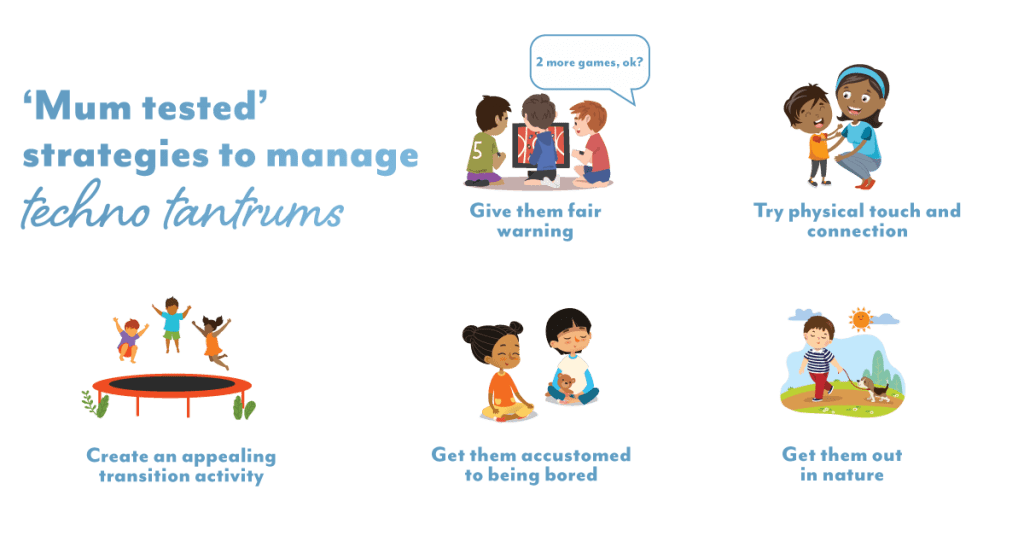A fireside chat with Dr Kristy Goodwin.
We sat down with Dr Kristy Goodwin to unpack some of the challenges of raising children in a digital age. Kristy has undertaken extensive research in this space and has been honing her expertise for the past decade, plus she’s also a mum of three boys.
“She makes relevant, realistic, research-based information available to parents, educators and caregivers, so that they can make educated and informed decisions on how they can navigate the digital landscape with young children – without the guilt, grief and guesswork!”
Fortunately for us, we are the beneficiaries of Kristy’s hard work and accumulated knowledge as she does a deep dive into what it means to raise a ‘screenager’.

So Kristy, what do you mean by the term screenager?
A ‘screenager’ is not a teenager and not a ‘threenager’. Some tell–tale signs that you have a screenager is that they have learned to tap, swipe and pinch, before they have learned to ride a bike, grip a pencil or tie their shoelaces! They don’t know what delayed gratification feels like. A long lag time for a screenager is more than the three seconds they spend waiting for a web or app to load.
These days, by the time a child turns eight, one full year of their life has been spent with digital technologies.
It’s patently clear that technology is playing and will continue to play a pivotal role in young people’s lives, and this is having a profound effect on their wellbeing, learning and their health.
Why is it so hard for us as parents to understand this landscape?
Well, our frame of reference was so different to that of our children. Our natural tendency is to panic when new technologies are introduced. But hysteria is not helpful. It arises in part because we can’t think back to our childhood and remember how our parents dealt with the digital dilemmas we’re facing.
We are navigating a world which is so different from our own and because technology is changing at such a rapid pace, we feel like we’re on the backfoot. And it’s no wonder, this is the first time in history that a generation of children know more about a topic than their parents do.
Technology is growing and evolving so fast, we can’t even ask someone with slightly older children what they did to manage this.
Does social media and smartphones play a major role in reducing mental health outcomes?
There is a correlation, but a causal relationship has not been established. Meaning, that it has not been proven if those already disposed to poor mental health are drawn to these platforms as a diversion, or coping mechanism, or if these technologies themselves are causing the adverse mental health outcomes.
It’s important to note that poor mental health outcomes aren’t caused by the technologies themselves, but by what these technologies are displacing.
So with this in mind, you don’t recommend banning technology but rather, planning for its use?
Exactly. We need parents, educators and caregivers to be the pilots of the digital world to teach children the skills they need to navigate it.
“Rather than labelling digital technologies toxic or taboo, we need parents and other trusted adults sitting fairly and squarely in the pilot’s seat helping our children to navigate this world, so that when they hit digital turbulence, we can help them to course correct.”
For example, when our children are unfortunately a victim of cyber bullying, exposed to aggression, violence or pornography or even an online predator is grooming them, if we’re in the pilot’s seat, we can be there to help them.
So how do you go about planning to be the digital pilot?
They key to this is what I call the ‘3 Bs’. Being Boundaries, Basic Needs and Boredom.
1. Boundaries
Setting limits to establish healthy digital habits is essential. To create these, you could consider:
- When are your no-go tech times?
- Where are your no-go tech zones?
- How are they being used?
- Who are they being used with?
When we’re considering limits, it’s helpful to think about the bigger picture. Young people need relationships, language, sleep, play, movement and nutrition to develop executive functions to create optimal learning, wellbeing and development. When screen time takes over, some of these basic needs are being displaced – and that’s why we are seeing a decline in mental health.
I would advise against using technology as a reward or punishment tool because it develops a ‘what’s in it for me’ relationship which can quickly become counterproductive. And perhaps more crucially, they will not come to you when they hit digital turbulence for fear they will be punished or ‘digitally amputated’.
You might want to set a rule for no access to screens first thing in the morning because it activates the sympathetic nervous system or the fight or fight or flee response. Or at night, when our logical pre-frontal cortex – the CEO part of our brain – switches off and the amygdale, the emotional part of the brain is fired up causing impaired decision making.
One of the key things I would also say is to establish firm boundaries together with our children so they can feel empowered.
2. Basic needs
The three basic needs that are most affected by digital technology overuse are: relationships, sleep and physical movement.
Relationships
Being connected is the most basic need we have as humans. When we are in close proximity with someone we release oxytocin, the social bonding hormone. We need to ensure that technology is not interfering with our relationships. We have to make sure we’re not missing the micro-moments of connection we have with our kids through poor digital hygiene. You don’t get that time back. We need to be good digital role models and reflect on how we use our own technology.
Sleep
Young people need the right quality as well as quantity of sleep. Without this it can affect their ability to learn and it can adversely affect mental health. It’s therefore advisable to end screen time 60-90 mins before they go to sleep as it can delay them getting to sleep. Young people need deep REM sleep to benefit memory, mood and learning. The blue light in devices adversely affects this important part of our sleep routine.
Physical movement
The third one is physical movement which creates positive neuro-transmitters such as serotonin – and we also know that physical activity is crucial for wiring the brain to learn.
3. Boredom
I believe the most important skill we need to cultivate in the digital world is the art of boredom. When we’re bored, we enter the default mode of thinking – otherwise known as day dreaming. We solve problems and create solutions in this state. We need to remember that white space, and being unplugged is vital for our physical, mental health and productivity.

Now for the big question, why do our kids experience the dreaded techno tantrum?
Rest assured that techno tantrums are normal! It’s a typical bio-neurological response to being unplugged from a digital technology. There are three major reasons why they happen.
1. Technology taps into our basic psychological needs as humans
The online world taps into these needs perfectly. The first one is connection – a basic primal need – which is served by the connections you can make via social media, group chat and multi-player games. The second is competency – for boys, tangible validation is gained through achieving gaming goals, or for girls, they can present an edited, highlighted and curated social media reel.
2. A developing brain is more vulnerable to tech temptations
The pre-fontal cortex only develops in males during their late 20s and early 20s for girls. This means their filter for what’s enough or appropriate is underdeveloped. Dopamine, the pleasure transmitter, is also stimulated by technology, and this also overrides the logical part of our brain. To compound this cocktail, GABA which is responsible for self-regulation decreases in production as children hit adolescence.
3. There are persuasive design principles at play that make the online world very alluring.
The intermittent variable reward system – or unpredictable reward ratio that hooks us into constantly checking our technology is integrated into many digital technologies. The digital world is also designed to be a bottomless world, it is infinite, there are no stopping cues or getting a sense you are done or complete. Plus experiences are personalised and curated via google algorithms, which makes it all the more appealing.
What are some of your tips to help us manage techno tantrums?
The below are ‘mum tested’ strategies to managing the intensity of techno tantrum land.
-
- Create an appealing transition activity – e.g. when you turn off the tv would you like to jump on the trampoline or walk around the block. Giving them a choice of activities gives them a dopamine hit and makes the transition easier for them.
- Give them fair warning – e.g. when you’ve finished this game, or in two episodes time, we’re turning this off.
- Get our kids accustomed to being bored
- Try to touch their arm for example as physical touch releases oxytocin
- Or, get them to do some movement or time in nature to calm their brain

What can we do to help to manage inappropriate content?
Rather than obsessing about time on technology, perhaps the more important question is, what content are they accessing and on which platforms?
Common sense media and the e-safety commissioner’s website are great resources to keep up to date with developments in technology.
I think it’s a must to install internet filtering software e.g. family zone. You can set screen time limits and usage windows.
However, none of these are failsafe. You cannot fence the ocean. That’s why you need to be the pilot of the digital plane.
A final word?
The basics work – if you work the basics!
We need educators and parents and caregivers to be the pilots – not the passengers – of the digital plane.
If we are the pilot, we are:
- Establishing boundaries
- Enabling basic needs
- Allowing them to be bored
Be kind on yourself and know that if you know more, you can do better.
About Dr Kristy Goodwin
Dr. Kristy Goodwin is a researcher, speaker, author, and mum. She is on a serious mission to help parents ditch their techno-guilt and raise happy, healthy children (without suggesting digital abstinence). She also helps professionals develop sustainable tech habits to ensure their health and performance isn’t sabotaged by the screens we’ve become dependent on.
To connect with Kristy, or for more information please visit Dr Kristy Goodwin.




